A cluttered bedroom can often lead to an untidy mind. The state of your environment profoundly impacts your mental well-being, and nowhere is this truer than in the space where you rest.
Decluttering your bedroom isn’t just about creating a visually pleasing environment; it’s about fostering a peaceful sanctuary that supports relaxation and mental clarity.
A messy, disorganized space can heighten stress, disrupt sleep, and increase feelings of anxiety. By decluttering your bedroom, you can create a calming atmosphere that promotes better sleep, boosts mood, and enhances focus.
Let’s explore how transforming your bedroom into a serene, clutter-free zone can benefit your mental health.
1. Understanding the Connection Between Clutter and Mental Health
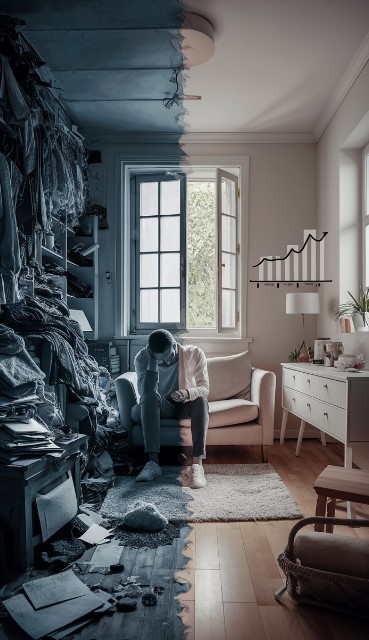
Understanding the connection between clutter and mental health is key to creating a space that nurtures well-being.
Clutter affects mental clarity by overwhelming the senses, making it difficult to relax and focus. A disorganized environment forces the brain to process more stimuli, leading to cognitive overload.
This can result in increased feelings of stress, anxiety, and emotional instability.
Research supports these observations. A study from UCLA’s Center on Everyday Lives of Families found that people living in cluttered spaces had higher levels of cortisol, the stress hormone.
Another study in the Personality and Social Psychology Bulletin showed that people who described their homes as cluttered were more likely to feel fatigued and depressed.
Clutter creates constant visual reminders of unfinished tasks, which can sap mental energy and reduce productivity.
Decluttering, therefore, isn’t just a matter of aesthetics—it’s a way to foster a clearer mind and improve emotional balance.
2. Benefits of Decluttering Your Bedroom
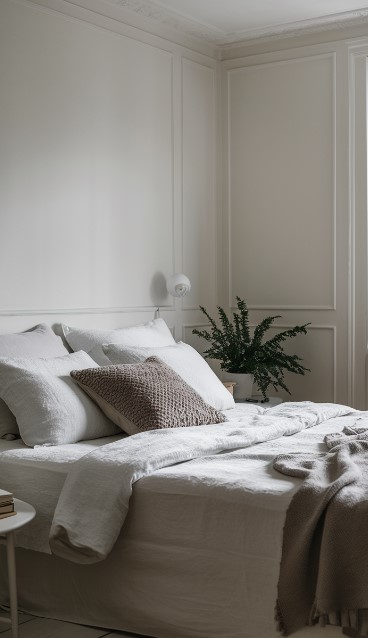
Enhanced Sleep Quality: A tidy bedroom promotes better sleep hygiene by reducing distractions and creating a peaceful environment.
Without the visual clutter, your brain can more easily unwind, helping you relax and fall asleep faster.
Reduced Anxiety and Stress: Clutter can make you feel overwhelmed and anxious, as a messy space often translates to a cluttered mind.
Decluttering your bedroom creates a calming atmosphere, allowing you to feel more at peace and less stressed.
Improved Focus and Productivity: An organized space sharpens your ability to concentrate and boosts productivity.
When your surroundings are clear, your mind can focus more easily, leading to increased efficiency in daily tasks.
Increased Self-Esteem: Decluttering can give you a sense of control and accomplishment. By taking the time to organize your space, you foster feelings of self-worth and pride, which can contribute to overall higher self-esteem.
3. Practical Steps to Declutter Your Bedroom
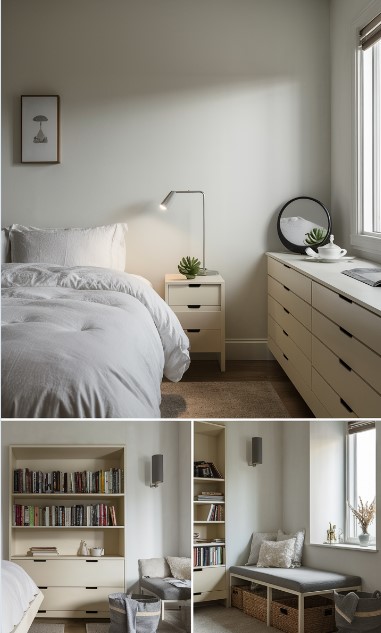
When decluttering your bedroom for mental health, start small to avoid feeling overwhelmed. Choose a manageable area like your bedside table or a single drawer.
Tackling one section at a time keeps the process from becoming too stressful and makes it easier to stay motivated.
Next, create a decluttering plan. Use the four-pile system: Keep, Donate, Trash, and Store. This method helps streamline decisions and makes it clear where items should go, reducing decision fatigue. Be honest about what you truly need and use.
Finally, focus on organizing surfaces and storage. Clear your nightstands, dresser tops, and floors of unnecessary items. Sort through drawers, closet spaces, and other hidden clutter that may be adding stress.
Invest in smart storage solutions like baskets or drawer organizers to keep everything in its place. A clean, organized bedroom supports a clearer, calmer mind.
4. Maintaining a Decluttered Space
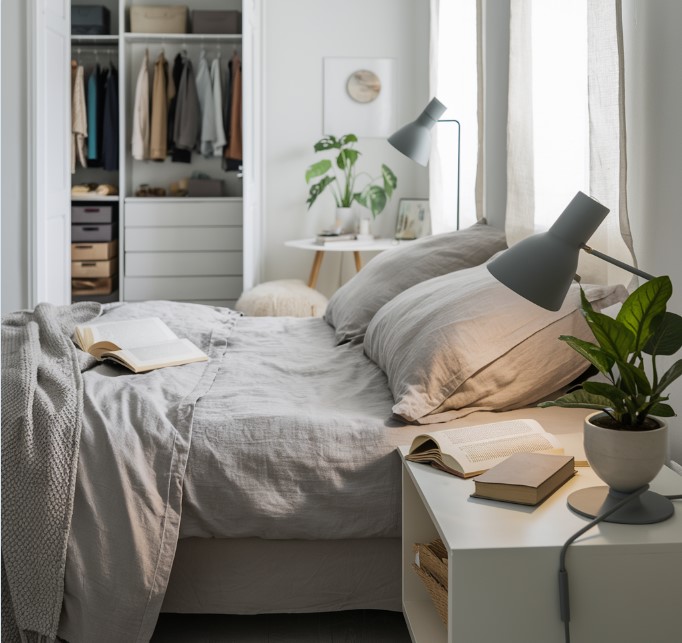
Once you’ve decluttered your bedroom, keeping it that way requires consistent habits. Start by establishing simple daily routines that prevent clutter from piling up.
Making the bed each morning sets a positive tone for the day and instantly creates a sense of order.
Likewise, putting items back in their designated places immediately after use—whether it’s clothes, books, or accessories—helps avoid a messy buildup.
In addition to daily habits, it’s important to schedule regular decluttering sessions. Set aside time every month or season to assess and tidy your space.
This allows you to reevaluate items, remove things you no longer need, and maintain the sense of calm that comes with a clutter-free environment.
By combining these daily and routine practices, you’ll ensure that your bedroom stays organized, making it a true sanctuary for mental relaxation.
5. Mindfulness in Decluttering
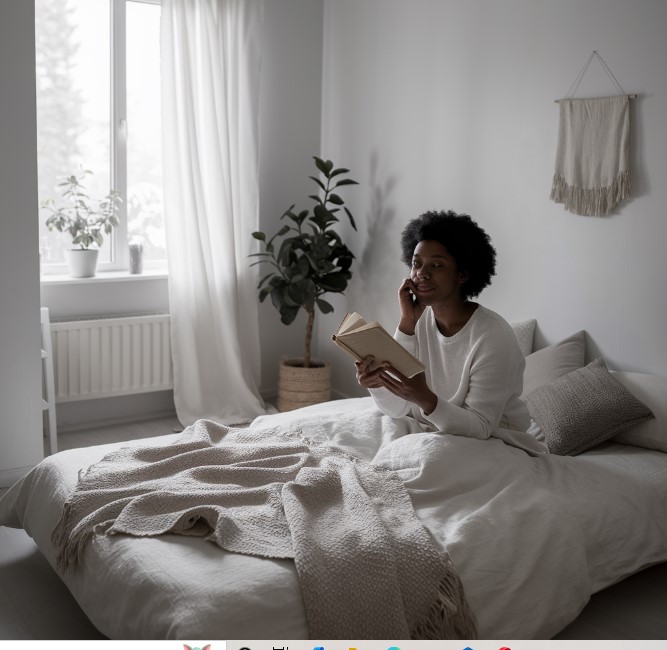
Decluttering can be more than just a chore—it can become a mindfulness practice that helps you connect with your space and yourself.
Viewing decluttering through a mindful lens allows you to slow down and reflect on each item in your bedroom.
Instead of quickly tossing things aside, mindfulness encourages you to ask, “Does this item bring me joy? Does it serve a meaningful purpose in my life?”
This process of conscious decision-making helps you cultivate gratitude for the items that truly matter and gently let go of things that no longer serve you.
It’s not just about removing clutter but creating intentional space for what uplifts your mental well-being.
As you declutter with mindfulness, you may notice that it becomes easier to clear mental clutter, too—freeing yourself from unnecessary stress and distractions.
Through this practice, decluttering transforms into a calming, reflective experience, giving you the mental clarity to foster a peaceful, purposeful environment.
Conclusion
In conclusion, decluttering your bedroom can have a profound impact on mental health. A tidy, organized space promotes relaxation and reduces feelings of stress or overwhelm.
By eliminating unnecessary items, you create a more peaceful environment that fosters better sleep and mental clarity.
Decluttering can also improve focus and productivity, as a clean space allows the mind to feel less burdened by visual distractions.
This process not only helps you regain physical order but also contributes to emotional well-being, providing a sense of control and calm.
Ultimately, maintaining a clutter-free bedroom is a simple yet effective way to support mental health and create a more restful, rejuvenating space.
1. How does decluttering my bedroom improve my mental health?
Decluttering your bedroom can significantly enhance your mental health by creating a calming and organized space.
A cluttered environment often leads to feelings of stress and anxiety, as visual chaos can overwhelm your senses.
By removing unnecessary items, you foster a sense of control and accomplishment, promoting a positive mindset.
An organized bedroom also encourages better sleep, as a tidy space can reduce distractions and create a peaceful atmosphere conducive to rest.
Additionally, the act of decluttering itself can be therapeutic, allowing you to reflect on your possessions and priorities.
Ultimately, a decluttered bedroom not only improves your physical space but also nurtures emotional well-being, leading to increased focus, reduced stress, and a greater sense of tranquility.
2. What are the signs that my bedroom is too cluttered and affecting my mental well-being?
A cluttered bedroom can significantly impact your mental well-being. Signs that your space is too cluttered include feeling overwhelmed or anxious when you enter the room, difficulty finding items you need, and a sense of chaos or disorder.
You might also notice a lack of motivation to maintain cleanliness or a reluctance to spend time in your bedroom.
If you find it hard to relax or sleep due to the visual clutter, this is a strong indication that your environment is negatively affecting your peace of mind.
Additionally, accumulating dust and dirt can lead to physical discomfort, further exacerbating stress.
Recognizing these signs can prompt you to take action and create a more serene, organized space that promotes relaxation and mental clarity.
3. Can a clean bedroom really reduce anxiety and stress?
A clean bedroom can significantly reduce anxiety and stress by creating a calm and inviting environment.
Clutter often contributes to feelings of overwhelm, making it difficult to relax and focus. When your bedroom is organized, it promotes a sense of control and peace, allowing your mind to unwind.
The visual simplicity of a tidy space can lead to improved mental clarity and a restful atmosphere, fostering better sleep quality.
Additionally, a clean environment can enhance feelings of productivity and accomplishment, further alleviating stress.
Incorporating calming colors, natural light, and minimal decor can amplify these effects, making your bedroom a true sanctuary for relaxation and rejuvenation.
Ultimately, investing time in decluttering and organizing your bedroom can have profound benefits for your overall mental well-being.
4. What specific areas of my bedroom should I focus on decluttering first?
Closet: Start with clothing items you haven’t worn in the past year. Sort through shoes, accessories, and seasonal items to create more space.
Dressers: Empty drawers and remove items that don’t belong. Organize clothes by type and frequency of use, keeping only essentials.
Nightstands: Clear off unnecessary items, such as old books, chargers, or random trinkets. Keep only what you need for easy access.
Under the Bed: This area often collects dust and forgotten items. Remove everything and categorize what you want to keep or discard.
Surfaces: Clear off any clutter from desks, shelves, and tables. Aim for minimalism to create a calming environment
5. How often should I declutter my bedroom to maintain a positive mental state?
To maintain a positive mental state, aim to declutter your bedroom at least once every three months.
Regular decluttering prevents the accumulation of unnecessary items that can create stress and overwhelm.
Additionally, establish a quick daily or weekly routine to tidy up, focusing on high-traffic areas like your nightstand and closet.
After seasonal changes, reassess your belongings to ensure everything you own serves a purpose or brings you joy.
If you notice a buildup of clutter or feel overwhelmed, don’t hesitate to declutter more frequently.
Ultimately, listen to your intuition; maintaining a clutter-free environment that reflects your style and needs is essential for promoting mental clarity and relaxation in your personal space.
